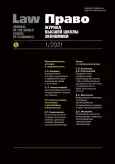Аксиологические аспекты государственного контроля и надзора
- Авторы: Агамагомедова С.1
-
Учреждения:
- Кафедра государственно-правовых дисциплин юридического факультета Пензенского государственного университета
- Выпуск: Том 14, № 1 (2021)
- Страницы: 37-61
- Раздел: Правовая мысль: история и современность
- URL: https://journals.rcsi.science/2072-8166/article/view/318093
- DOI: https://doi.org/10.17323/2072-8166.2021.1.37.61
- ID: 318093
Цитировать
Полный текст
Аннотация
Об авторах
Саният Агамагомедова
Кафедра государственно-правовых дисциплин юридического факультета Пензенского государственного университета
Email: noreply@hse.ru
Доцент, кандидат юридических наук
Список литературы
- Andrushin S.A., Dadashev A.Z., Sokolovskaya E.A. (2002) Financial control in Russia: papers of round table. Moscow: Institute of Economics, 250 p. (in Russian)
- Bahrah D.N., Skorohodova V.V. (2007) Delegating power functions to commercial banks. Sovremennoe pravo, no 11, pp. 2-5 (in Russian)
- Big encyclopedia dictionary (1991) A. M. Prokhorov (ed.). Vol. 2. Moscow: Sovetskaya encyclopedia. 768 p. (in Russian)
- Burkova A. Yu. (2020) Deregulation. Yurist, no 1, pp. 71-73 (in Russian)
- Cerny G. (1991) Limits of deregulation. European journal of political research, vol. 19, pp. 173-196.
- Chirkin V.E. (2009) Public power in the contemporary society. Zhurnal rossiyskogo prava, no 7, pp. 3-13 (in Russian)
- Dean S. (2011) Tax deregulation. New York University law review, vol. 86, pp. 387-436.
- Demin A.B. (2017) Disposition and taxation. SPS Consultant Plus (in Russian)
- Dobrolubova E.I. (2016) Results and efficiency of state control in labor relations. Statistika i ekonomika, no 6, pp. 49-55 (in Russian)
- Doronina N.G., Semilutina N.G. (2015) Russian modern economic law. In: Law and economic activity. A.V.Gabov (ed.). Moscow: Statute, pp. 25-35 (in Russian)
- Gubin E.P. (2019) The principles of business. Business law in Russia: trends and ways of progress. Moscow: Yustitsinform, 664 p. (in Russian)
- Malkov V.V. (1965) Social control in Soviet state administration. Moscow: University, 123 p. (in Russian)
- Martynov A.V. (2017) New approahes to establishing guidelines for enterpreneurs. In: Law, economic progress and state regulation. V.A.Vaipan (ed.). Moscow: Justitsinform, pp. 65-89 (in Russian)
- Maslennikova E.B. (2018) Study in reforming control and supervision in Russia. Vestnik RUDN, no 3, pp. 318-342 (in Russian)
- Nersesiantz V.S. (2005) Philosophy of law. Moscow: Norma, 656 p. (in Russian)
- Nozdrachev A.F., Zyrianov S.M., Kalmykova A.V. (2017) Reform of state and control and supervision. Zhurnal rossiyskogo prava, no 9, pp. 34-46 (in Russian)
- Nureev R.M., Latov Yu.V. (2006) What dependency from the past means and how Russian economists analyze it. In: The sources: experience of exploring economics. Moscow: Ekonomika, pp. 228-255 (in Russian)
- Romanovskaya O.V. (2017) Delegation of state powers in system of public law. Vestnik Permskogo Universita, no 2, pp. 143-154 (in Russian)
- Salnikov M.V. (2013) Western legal tradition: values and ideals. Mir politiki i sotsiologii, no 10, pp. 170-191 (in Russian)
- Talapina E.V., Efremov A.A., Cereshneva I.A. (2019) Prospects of implementing dispatched register methods for fulfilling state functions. Administrative pravo i protsess, no 11, pp. 41-44 (in Russian)
- Tereschenko L.K. (2019) State regulation and deregulation in communication sphere. Zhurnal rossiyskogo prava, no 10, pp. 98-108 (in Russian)
- Tonkov E.E. (2018) Creative state, alternative to corporatism. In: Law and state in the world: papers of a conference. Belgorod: GIK press, pp. 8-18 (in Russian)
- Winston C. (1993) Economic deregulation: days of reckoning for microeconomists. Journal of economic literature, vol. 31, pp. 1263-1289.
- Yakunin V.I., Sulakhin S.S., Fonareva N.E. et al. (2009) Competition policies in the Russian Federation. Vol. 2. Moscow: Expert, 352 p. (in Russian)
- Yuzhakov V.N., Dobrolubova E.I., Pokida A.N., Zybunovskaya N.V. (2017) How business feels results of state control. Moscow: Delo, 352 p. (in Russian)
- Zhavoronkov S. et al. (2001) Deregulation of the Russian economy. Moscow: RAN, 70 p. (in Russian)
- Zorkin V.D. (2008) Axiological aspects of Russian Constitution. Sravnitelnoe konstitutsionnoe obozrenie, no 4, pp. 7-20 (in Russian)
Дополнительные файлы








